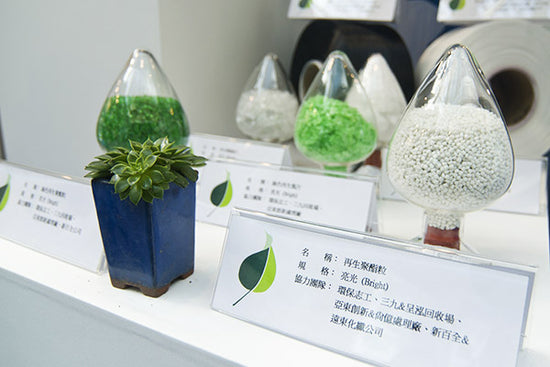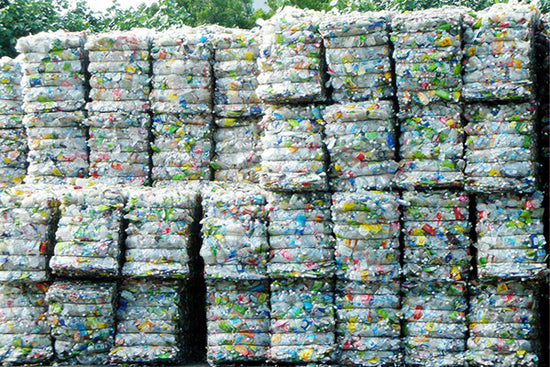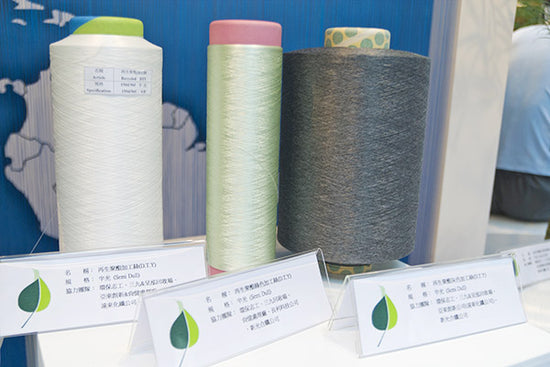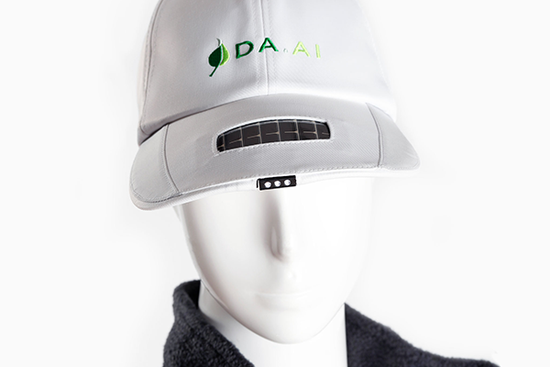Process & Materials

DA.AI Recycle To Recycle (R2R) Series
DA.AI has been dedicated to world sustainability since its establishment over a decade ago in 2008. With its eco-products crafted from recycled PET plastic bottles, the company helps to avoid potential environmental crises, as well as the burning and burying of unrecycled PET products. DA.AI has now additionally set out to solve the growing problem of discarded and left-over clothing.
After obtaining Cradle to Cradle® certification, DA.AI continued to pursue its course of research, and reached a milestone in July of 2015: transforming recycled fabric back to its PET chip form, thus, enabling the creation of new eco-products. A series of products is now available through this process, which consumes fewer resources and less energy than conventional means of production. One item created through this method is the DA.AI eco-blanket. These special blankets made with love are then given to survivors of disasters by Tzu Chi volunteers during relief missions.
Following the patenting of DA.AI's Recycle-To-Recycle® (R2R®) Series in Taiwan, the company officially shifted from a “waste reduction” green brand to a “zero waste” green global role model.
Shop Recycle to Recycle Series
Compassion Technology Series
When Tzu Chi volunteers go into disaster areas to provide relief aid, DA.AI is there to provide key tools to keep them safe and maximize their productivity. Placing function first is an absolute must, and these items are your reliable friends when the going gets tough. Recycled and Earth-friendly materials are used wherever possible.
Shop Compassion Technology Series
Low Carbon Lifestyle Series
The reduction of our carbon footprint is an essential human commitment and one that DA.AI takes seriously. DA.AI Technology strives to produce a series of everyday items that shall help achieve our goal. The processes used have received numerous awards and certifications, including the Control Union GRS 3.0 Certification.
DA.AI Technology is thus inspired by the clarion call of the international humanitarian organization Tzu Chi, to improve our treatment of the Earth. DA.AI’s mission goes beyond recycling unwanted plastic PET materials. Just like our DA.AI Tech yarn, we’ve established a process that is deeply interwoven with love, from resource reclamation to creating exceptional products and sparking greater social responsibility. When you purchase DA.AI products, you are not just becoming a customer — you are becoming part of something much larger. We hope our philosophy, hard work, and eco-friendly products will also inspire more people to embrace a lifestyle that is in harmony with the Earth and all sentient beings.
Shop Low Carbon Lifestyle Series
DA.AI Technology: Eco-Tech Wood
With the dawn of "fast fashion"clothing consumption has changed dramatically. According to a publication from the Ellen MacArthur Foundation titled "A New Textiles Economy: Redesigning fashion’s future", clothing production has roughly doubled from 2000 to 2015. However, only 13% of clothing materials were effectively recycled and reused. Nearly 73% ultimately ends up in landfill or incinerated.
The toxins and pollution produced from both the creation and disposal of these clothing items are detrimental to the environment. Therefore, DA.AI Technology is committed to improving the rate at which clothing is used and recycled, and has developed a unique composite material made of discarded fabrics and recycled plastics. DA.AI then transforms this composite material into durable DA.AI Tech wood.
DA.AI Technology: Compression Fabric
When a horrible explosion occurred in Taipei in 2015, nearly 500 of the young survivors were required to wear pressure suits for one or more years throughout rehabilitation. This was when DA.AI Technology endeavored to replace the uncomfortable traditional fabric used with a new design which focused on providing elasticity, breathability, and comfort, while still maintaining sufficient pressure.
Due to the patented cross-sectional Supernet® knitting method and cool yarn, DA.AI’s new fabric was substantially more comfortable, breathable, and fostered better mobility. This lead to an increase in willingness to participate in rehabilitation. And indeed, DA.AI wished to help these youngsters and all future burn survivors heal in such a time of need, and return to their livelihoods as soon as possible. This patent is additionally used in the development of long-term care products.
DA.AI Technology: Wise Eco-Plastic
According to a report released by the United Nations on World Environment Day in 2018, approximately 9 billion tons of plastics are manufactured each year. However, only a staggering 9% of that plastic is recycled. Thus, 8 million tons of plastic waste flows into our oceans annually. Companies are therefore encouraged to adopt production and consumption patterns of plastic materials that follow a “Circular Economy.” During the United Nations Environment Assembly (UNEA-4) which took place in March of 2019, as many as 170 countries vowed to substantially reduce the amount of single-use plastic products by 2030.
DA.AI Technology Co., Ltd. recycles discarded polyethylene terephthalate (PET) plastic bottles which are collected by Tzu Chi volunteers, and gives the plastic waste new life as high-quality, eco-friendly rPET textiles without increasing the total PET volume. DA.AI Tech's "Wise Eco-Plastic" series thereby utilizes these recycled materials as a means of reducing plastic pollution. Recycled PET is transformed into everyday essentials from clothing to backpacks, and recycled polypropylene (PP) is used in the creation of stationery items. Through these innovative methods, DA.AI upholds its goal of supporting Mother Earth, lessening the burden that excessive municipal plastic waste places on our planet and all sentient beings.
DA.AI’s recycled PET chips — an eco-option derived from PP — comes from these recycled PET bottles. DA.AI's manufacturing process furthermore conserves an average of 84% less water and 77% fewer carbon emissions than traditional production methods.
Although PET’s high elasticity, UV resistance, and durability are ideal for the great outdoors, it is not often the choice for molded plastics. With DA.AI's substantial experience using recycled PET materials and utmost dedication to the planet, however, DA.AI and its partners successfully modified recycled rPET materials in 2017 to be made into daily necessities, fulfilling both consumer needs and the essential goal of environmental sustainability.
According to the Global Packaging Trends, 480 billion PET bottles were sold in 2016, equivalent to 20,000 bottles per second. The number has increased by 300 billion bottles as compared to statistics 10 years prior. In 1992, the Taiwanese government promoted a $2NT refund per bottle, which successfully raised the country’s original 20% recycling rate to 80%. While the policy was canceled in 2002, the PET bottle recycling rate continued to soar as high as 95%, leading to 90,000 tons of plastic bottles being recycled in 2015. Compared to the 59% recycling rate in Europe and 31.8% in the U.S., Taiwan is ahead in terms of recycling.
Characterized by elasticity, durability, insulation, and impact resistance, raw materials from polyethylene terephthalate (PET) are derived from crude oil and natural gas. PET is not so easily biologically degradable, creating a detrimental impact on our environment. Despite recognizing the best solution is to ultimately discontinue the use of PET, Taiwan still relies on PET packaging, using as much as 70 million kg of crude oil to make these packaging options annually. The world’s top beverage manufacturers only use 6.6% recycled PET for their packaging, and 1/3 of producers are unwilling to increase this ratio, let alone switch to 100% recycled PET. Thus, the question of how better to utilize recyclable materials becomes a priority in solving this environmental crisis.
One of DA.AI’s chief goals for 2017 was to develop everyday essentials such as stools, chairs, and more, which are made from modified recycled PET materials, thus substituting the need for PP. This is no easy feat, as replacing PP with a material comprised of such different characteristics is quite difficult.








